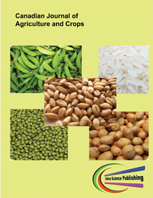Nutritional, Calorie and Thermal Properties of Some Selected Food Grade Sorghum Grains from Maiduguri, Borno State, Nigeria
DOI:
https://doi.org/10.20448/803.5.1.41.51Keywords:
Sorghum, Nutrition, Calorie, Thermal properties, Maiduguri, Nigeria.Abstract
Sorghum is an important crop in many countries of Africa and Asia and serves as a dietary sources of protein, calorie, minerals and vitamins for millions of people in this regions. The concentration of the different nutrients and thermal behavior varies among different cultivars of sorghum and therefore affect its nutritional contribution and selection for processing. In this study, we evaluate the proximate, calorie, mineral and thermal properties of 9 cultivars of sorghum varieties marketed in Maiduguri, Borno State, Nigeria. The results showed significant variation (p<0.05) in the moisture content 6.07-8.82%, ash, 1.41-2.17%, fat 3.15-5.12%, protein 10.30-14.10%, crude fiber 1.83-2.50% and total carbohydrate 71.57-78.07%. While calorie ranges between 379.02 -391.03 kcal/100g. The concentration of minerals ranged from 0.08-0.78, 079-9.38, 1.93-9.16, 0.62-0.70, 0.11-0.44 and 0.01-0.02 mg/100g in Zn, K, Ca, Mn, Fe, and Cu respectively. Specific heat capacity averaged 1.642 KjKg-1K-1 within a range of 1.602 to 1.677 KjKg-1K-1, while the thermal conductivity varied from 2.529 to 2.590 Wm−1K−1 with a mean value of 2.556 Wm−1K−1 and thermal diffusivity ranges from 8.41x10-6 ms−2 to 8.57x10-6 ms−2 with a mean value of 8.49x10-6 ms−2. The results showed that the value obtained were all within reported values and could assist in diet planning for a particular situation for those who solely depend on sorghum grain.


